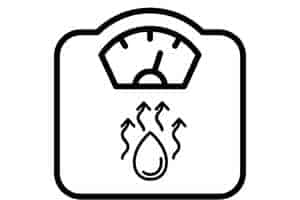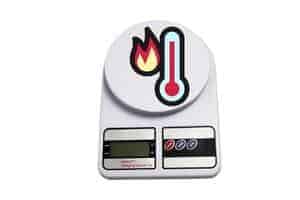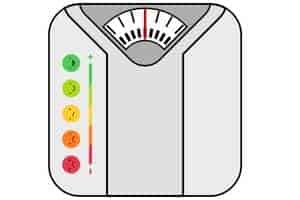Are Digital Scales Accurate: Why they Keep Changing Weight?

If you’ve ever stepped onto a digital scale, you know the feeling of anticipation. Will this number match what it should? Or will the display readability show something different than expected? Nothing is more frustrating than recalibrating your sense of self-worth every time you step on the scale.
The digital scale can symbolize so many things in life – from our physical health and wellness to our mental well-being. But Are Digital Scales Accurate? Can they provide a correct result each time we use them?
In this article, we’ll explore why digital scales keep changing weight, whether or not they’re accurate, and steps you can take to ensure your results are consistent over time.
By understanding the science behind why these scales behave the way they do, you’ll gain a better insight into how reliable their readings are. With this newfound knowledge, you’ll no longer have to guess yourself second when stepping on the scale – allowing you to focus on mastering other aspects of your life instead!
What Are Digital Scales?
Digital scales use digital technology to measure weight, typically kilograms or pounds. They usually have a digital display that shows the importance of an item.
Scales often come with features like tare, allowing you to zero out the scale after placing a container on it, and hold, which keeps the weight displayed even after you remove the item. Digital scales are popular in various industries, including healthcare, manufacturing, and retail.
Factors Affecting Accuracy
Weighing yourself accurately is essential for monitoring your health and keeping track of progress—but did you know that scales come with various factors affecting accuracy? From surface flatness to maximum weight capacity, there are many things to consider when purchasing one.
Smart scales provide data like BMI, hydration levels, bone density, and muscle composition. To get the most accurate results every time, Please keep in mind below factors mentioned below that could affect accuracy.
Incorrect Calibration Settings
Digital scales are accurate tools for weighing, but they must be calibrated correctly to maintain their accuracy. Tweaking can be done using official calibration weights or a known weight object. It should be performed regularly to ensure reliable results.

Scales are convenient due to their large LCDs, while mechanical scales offer greater precision without requiring adjustment settings. Taking the time to calibrate your digital scale properly will help you get the most out of it.
Surface Irregularities
Digital bathroom scales are only sometimes accurate, as uneven surfaces like carpets and rugs can affect readings.

Most scales come equipped with either glass or load cells to ensure accuracy, providing increased stability and accuracy when used on hard surfaces.
However, irregularity in the flat surface still has an effect; for example, glass scales are more sensitive than others and may not accurately measure BMI, while carpeting and textiles create inconsistencies due to compression/expansion.
Therefore, it is recommended that users ensure a stable base before use and invest in floor mats if access to a hard surface isn’t available.
Load Imbalance
Digital bathroom scales require regular maintenance and tweaking to ensure consistent accuracy. Load imbalance, caused by muscle mass or other items placed unevenly on the scale platform, can lead to inaccurate readings.

Smart scales use built-in motion and pressure sensors to detect irregularities in your weight reading and adjust accordingly.
Additionally, it is crucial to ensure any objects used on the scale are spread evenly before taking a weight reading for the best results. By following these steps, you can be sure your scale will accurately measure your body weight.
Low Battery Power Or Instability
Digital scales can have inconsistent readings due to either low battery power or instability. Low battery power will cause variation as the batteries to run down, so you may need new batteries for improved accuracy.

Instability is often caused by static electricity building up around and on the device; moving it away from nearby electrical sources can help combat this issue.
Additionally, ensure the weighed item is evenly balanced on the scale before measuring. To get the best performance out of your scale, periodically replace old batteries and reduce interference from other sources like static electricity.
Water Or Moisture Induced Damage
Digital scales are more accurate than analog, but their accuracy can be affected by water or moisture. To minimize the risk of damage, store it in a dry place away from direct sunlight and regularly clean, it while avoiding displacement of its internal components.

If exposed to moisture, immediately check connections for physical damage, dry out all parts that came into contact with liquid, retest for accuracy, calibrate using an external weight, and consult the manual for tips on restoring proper function.
Following these steps, you should quickly fix any issues caused by water-induced damage and enjoy readings again!
Buildup Of Residues Or Dirt
Have you ever seen a digital scale that kept changing weight? This is often caused by the buildup of residues or dirt on the sensors and other components. These accumulations can cause inaccurate readings, so keeping your scales clean for accurate measurement is essential.

Accurate scales now have many features, including body fat percentage, muscle mass, bone mass, and self-reported weight estimates. While these bonus features are great for tracking progress over time, they require frequent tweaks to be as accurate as possible.
Without regular tweaking, slight drifting will occur, which further impacts accuracy. You should follow manufacturer guidelines when performing maintenance checks, like cleaning and recalibrating your device.
Regularly cleaning your scale ensures optimum performance while also preventing any potential damage due to dust settling into the electronics or mechanics of the system. Doing this helps extend its life expectancy while giving users confidence their data results are reliable and consistent every time they step on their scale.
External Environmental Factors
scales are generally accurate, but external environmental factors can affect the weight they display. Human error is one of the main reasons why digital scales keep changing weights. For instance, if you don’t stand still while weighing yourself, your results will not be as precise.

Additionally, body fat and other variables, such as water retention or muscle mass, can also influence the accuracy of a digital scale.
Weight loss goals are another factor affecting the accuracy of scales since it involves weight distribution and bone density changes over time. Therefore, when attempting to track progress towards a goal like losing or gaining weight, it’s essential to take measurements at consistent intervals to minimize any variation due to external factors.
This way, you can get an accurate picture of your progress and make better-informed decisions about your health journey. The publication time should also be considered when using scales for tracking purposes – newer models tend to have more advanced features that allow more correct readings than older versions.
Faulty Or Overloaded Parts
You’ve likely noticed the scale that reads your weight one day and then shows an entirely different number the next. But why does this happen? The answer is faulty or overloaded parts in the scales.

Accurate weight readings depend on the precision of all its components – from sensors to internal wiring and circuits. If any part malfunctions, it can lead to inaccurate readings.
Furthermore, you overload your scales with an extreme weight beyond their capacity rating. In that case, they may be unable to provide correct weight measurements anymore.
This includes weighing more than what’s allowed within the allowable tolerance range of the digital scales. Since even minor errors can result in incorrect measurements, handling faulty parts and operation limits is vital for ensuring accurate performance over time.
Exposure To Extreme Temperatures
One of the critical factors that can affect a digital scale’s accuracy is exposure to extreme temperatures. Temperature variation, both high and low, has been shown to cause inaccurate readings in some scales.

According to research, “Digital scales are designed with components sensitive to temperature changes, so when exposed to extreme temperatures, they may become unstable or even fail.”
This means that if you expose your scale to extremely cold or hot conditions, it won’t be as accurate as it would be in average temperatures.
Digital scales can be unreliable when it comes to accuracy over time, as they measure weight imprecision that can be affected by environmental factors such as temperature. On the other hand, analog scales don’t rely on electronics and give more consistent readings for birth weight or child measurements. So if you’re after precision, an analog may be the way to go. Here are some key points to remember:
- Digital scales measure absolute weight imprecision from moment to moment.
- Environmental factors like temperature can affect digital scale results.
- Analog scales provide more reliable, consistent readings than digital scales.
This makes it essential to keep your scale away from any elements, such as direct sunlight or air conditioning vents, that could cause drastic temperature changes. By avoiding these temperature extremes, you can help ensure an accurate reading each time you use the scale.
Interference From External Sources
Have you ever stepped on a digital scale and noticed that the number keeps changing? Are these scales accurate? The truth is that the scale can be exact when measuring weight. But external factors can affect their accuracy from time to time.

Here’s what you need to know:
- According to BMC Public Health, bathroom scales can give readings up to 5% different than those of more precise scales when considering body composition.
- Body composition scales and medical impedance meters use electrical currents to measure your body’s fat content and other components like muscle mass and water levels – all of which factor into one’s total weight. But fluctuations in environmental conditions, such as temperature, humidity, and air pressure, can cause discrepancies in these devices’ measurements.
- Regularly calibrating your device ensures its accuracy over time.
So while digital scales can provide an accurate reading of your body weight at any given moment, they should not be used as a substitute for professional medical advice or diagnosis.
If you’re concerned about your health or want a reliable way to track changes in your body over time, speak with a doctor or consult a certified nutritionist who can help you set realistic goals and monitor your progress effectively.
How Digital Scales Work?
Have you ever wondered how scales work? It’s pretty simple – they utilize a strain gauge load cell to convert the force of weight into an electric signal. This signal is then processed by a microchip and displayed on the screen, giving you your accurate reading!
Unlike analog scales, which rely on springs to indicate the weight of an object, digital scales take it one step further by converting mechanical energy into electrical signals.
The process involves Wheatstone bridge principles, where a set of strain gauges is arranged in a bridge circuit inside the load cell.
When weight is applied to the scale, it causes deformation in the strain gauges resulting in changes in their resistance which can be measured and converted into an electric signal.
So next time you stand on that digital scale, remember what happens behind the scenes:
- A strain gauge load cell converts the force of weight into an electric signal.
- The signal is then processed by a microchip and displayed on the screen.
- Digital scales rely on the conversion of mechanical energy into electrical signals.
- A strain gauge set is arranged in a bridge circuit inside the load cell.
Calibration And Accuracy
Digital scales are incredibly accurate when it comes to measuring weight. Still, variations in readings can be caused by misadjustments or slight measurement errors.
To ensure consistent results, most digital scales feature a ‘calibration’ feature that helps keep measurements precise and consistent.
Additionally, some models come with additional features, such as body mass index, which can help improve accuracy further. Investing in a quality model with built-in tweaking and other helpful features is worth considering for the most precise measurements over time and peace of mind.
Understanding The Calibration Process
Calibrating a digital scale is a simple process that requires no expensive equipment. All you need is a single-pound dumbbell and a power switch. After placing the weight onto the platform, wait until the display reads 1 lb exactly before moving on to another test weight or item.
If your reading varies by more than half a pound, repeat the tweaking process until accuracy within 0.5 lbs of your initial reading is achieved.
Once calibrated accurately, even minor items like jewelry or coins can be weighed on the display screen reliably. Public health experts suggest calibrating every 3-6 months for optimal results.
Conclusion
The accuracy of digital scales is vital for many reasons. But if you’ve ever wondered why your scale keeps changing weight, a few factors can affect its accuracy. Incorrect tweak settings, surface irregularities, and load imbalance can throw off the accuracy of a digital scale. It’s also possible for external interference to impact its results.
Reference Sources:
https://shop.transcell.com/how-digital-scales-work/
https://www.quora.com/How-does-digital-weighing-machine-works

